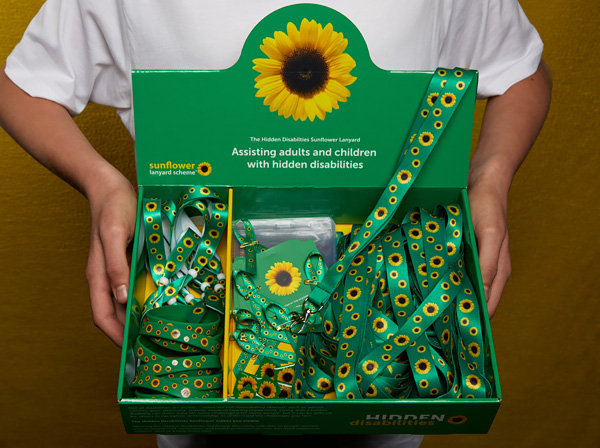
To better meet the needs of all travelers, Northwest Florida Beaches International Airport (ECP) has partnered with the Hidden Disabilities Sunflower Program. The Hidden Disabilities Sunflower is a simple tool for passengers to voluntarily share that they have a disability or condition that may not be immediately apparent, such as autism, PTSD, or hearing loss. A Sunflower-branded product discreetly informs Airport staff and airline crew that the wearer may need extra assistance while traveling.
ECP staff anticipates the program will be implemented early this summer. Soon, passengers with hidden disabilities will be able to request a free Sunflower lanyard, pin, button, or other identifier at ECP. Passengers who are already in the program will be welcome to wear their own Sunflower product if they already have one.
“Here at ECP, we strive to make all passengers feel comfortable and confident,” said Parker W. McClellan Jr., A.A.E., ECP Executive Director. “By partnering with the Hidden Disabilities Sunflower Program, we are enhancing accessibility for all passengers. Our staff will soon be trained to easily spot passengers wearing the Sunflower and provide them with additional support.”
There is no qualifying list of hidden disabilities. If a passenger has a hidden disability and feels like they would benefit from wearing a Hidden Disabilities Sunflower product, ECP encourages them to do so. Once the program is in place, passengers should also continue to coordinate with their airline and/or TSA Cares for accommodation arrangements.
The Hidden Disabilities Sunflower Program was pioneered in 2016 at the Gatwick International Airport in London. The program has since been implemented globally by organizations across sectors including transportation, retail, finance and education. Awareness of the program continues to grow in the United States, where it has been adopted by approximately 80 airports. See the list of participating airports here.
“We are delighted that ECP is joining the global Hidden Disabilities Sunflower network,” said Paul White, Hidden Disabilities Sunflower CEO. “By introducing the Sunflower throughout the airport, ECP is complementing their accessibility to support passengers with non-visible disabilities. Sunflower wearers travel for many reasons, and the knowledge that they will receive support when needed increases their confidence to travel.”
Globally, 1 in 7 people live with a disability. While some experience visible disabilities, many others have a non-visible condition or experience a combination of both visible and non-visible conditions. These disabilities can be neurological, cognitive and neurodevelopmental as well as physical, visual and auditory. They can also be respiratory or include chronic health conditions like arthritis and diabetes. With these diverse access needs in mind, it is important for businesses serving travelers to try to improve accessibility within their public spaces.
“We have seen the tremendous success of the Sunflower program at other airports around the world,” said McClellan. “It is important we bring the program to ECP to ensure that passengers with hidden disabilities have an enjoyable travel experience.”
According to Hidden Disabilities Sunflower, a Sunflower lanyard or other identifier is a visual cue that helps people to acknowledge the daily barriers faced by someone living with an invisible disability. A sunflower design was selected because it represents positivity, strength and growth. For more information about the Hidden Disabilities Sunflower Program, visit https://hiddendisabilitiesstore.com/us/.